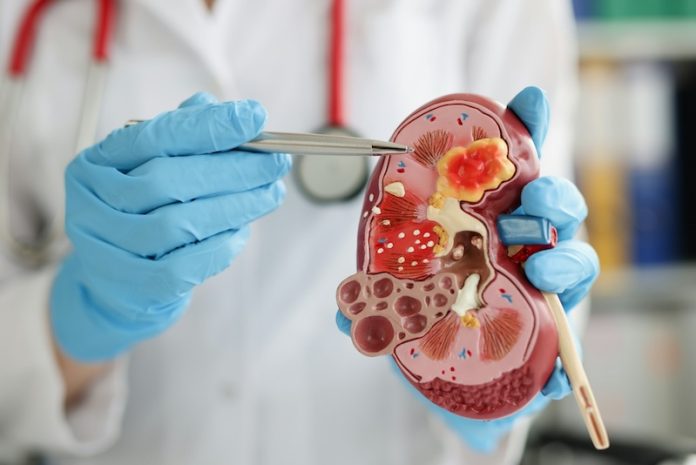
Kidney disease is a serious health issue, especially for older adults. It often develops slowly and quietly, making it difficult to spot until it’s advanced. As people age, their kidneys naturally become less efficient, and older adults are more likely to develop chronic kidney disease (CKD).
This condition happens when the kidneys are damaged and can’t properly filter waste and fluids from the blood. When waste builds up in the body, it can cause various health problems.
One of the biggest challenges with CKD is that the symptoms can be mild or mistaken for normal aging.
However, early detection and treatment can prevent the disease from getting worse and improve quality of life. Knowing what to look for can make a big difference in managing kidney health.
How Kidney Function Changes with Age
As people age, kidney function naturally declines. This is why older adults are more vulnerable to CKD. The kidneys are essential organs that remove waste and excess fluids from the body, help control blood pressure, and produce important hormones.
But with time, they can become damaged due to conditions like high blood pressure or diabetes, making it harder for them to work effectively.
Subtle Symptoms That May Indicate Kidney Disease
Because CKD symptoms can be subtle, they often go unnoticed. Many people attribute them to getting older or other health issues. However, there are several signs that may suggest kidney disease in elderly individuals.
Changes in urination: One of the most common symptoms of kidney disease is changes in how often a person urinates. Some people may notice they need to go to the bathroom more frequently, especially at night.
Others may see their urine is foamy or bubbly, which can be a sign of protein leaking into the urine. Blood in the urine is another possible symptom, as is a decrease in how much urine is produced, even with normal fluid intake.
Swelling or edema: When the kidneys are not working well, they can’t remove excess fluid from the body. This can cause swelling, especially in the legs, ankles, feet, hands, and even the face. This swelling can be uncomfortable and may signal that kidney function is declining.
Fatigue and weakness: The kidneys produce a hormone that helps the body make red blood cells, which carry oxygen. When the kidneys are damaged, they may not produce enough of this hormone, leading to anemia. This can make a person feel tired, weak, and generally unwell.
Trouble sleeping: A buildup of waste products in the blood, known as uremia, can make it hard to sleep. Some older adults with kidney disease also experience conditions like sleep apnea or restless leg syndrome, which can further disrupt sleep.
Nausea and vomiting: Waste that accumulates in the body can cause constant nausea or even vomiting. This can make it difficult for a person to eat properly, leading to weight loss and malnutrition.
Loss of appetite: In addition to nausea, kidney disease can affect a person’s sense of taste, making food less appealing. This may result in a noticeable loss of appetite and unintentional weight loss.
Cognitive problems: Severe kidney disease can also impact brain function. Older adults may experience difficulty concentrating, personality changes, or confusion. These cognitive symptoms can be overlooked, as they are often attributed to other aging-related conditions.
Dry, itchy skin: When the kidneys can no longer balance minerals and nutrients in the blood, it can lead to mineral imbalances. This may cause the skin to become dry and itchy, a common issue in people with advanced kidney disease.
Why Regular Check-ups Matter
Because the early symptoms of kidney disease can be so mild, regular medical check-ups are extremely important for older adults.
Blood and urine tests can reveal important clues about how well the kidneys are functioning. Early detection can lead to treatments that slow the progression of the disease, helping to preserve kidney function and prevent complications.
In some cases, lifestyle changes, such as controlling blood pressure or managing blood sugar levels, can make a big difference. For others, medications may be needed to support kidney function.
Conclusion
Recognizing the signs of kidney disease in elderly adults can be difficult because many symptoms are similar to those of other common health problems.
However, it’s important for older individuals and their caregivers to be aware of specific changes in urination, energy levels, and overall health. If any unusual symptoms appear, it’s a good idea to see a doctor for further testing.
Early intervention is key to managing kidney disease and ensuring a better quality of life for older adults. With proper care and attention, it’s possible to slow the progression of the disease and maintain kidney health for as long as possible.
If you care about kidney health, please read studies about drug that prevents kidney failure in diabetes, and drinking coffee could help reduce risk of kidney injury.
For more information about kidney health, please see recent studies about foods that may prevent recurrence of kidney stones, and common painkillers may harm heart, kidneys and more.
Copyright © 2024 Knowridge Science Report. All rights reserved.



